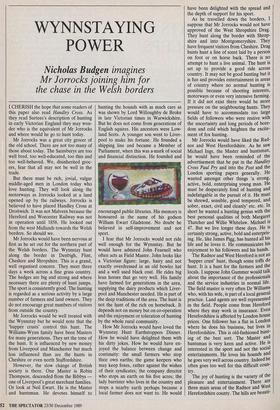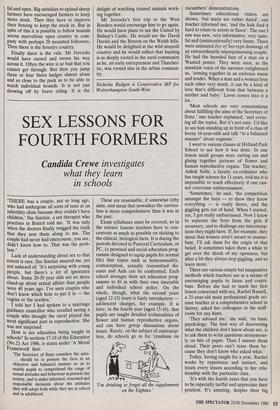WYNNSTAYING POWER
Nicholas Budgen imagines
Mr Jorrocks joining him for the chase in the Welsh borders
I CHERISH the hope that some readers of this paper also read Handley Cross. As they read Surtees's description of hunting in early Victorian England they may won- der who is the equivalent of Mr Jorrocks and where would he go to hunt today.
Mr Jorrocks was a great city grocer of the old school. There are not too many of those about today. The Sainsburys are too well bred, too well-educated, too thin and too well-behaved. We, disinherited groc- ers, fear that all may not be well in the trade.
But there must be rich, jovial, vulgar middle-aged men in London today who love hunting. They will look along the motorways as Jorrocks looked at a land opened up by the railways. Jorrocks is believed to have placed Handley Cross at Droitwich. It was not Malvern because the Hereford and Worcester Railway was not in operation until 1858. He looked out from the west Midlands towards the Welsh borders. So should we.
Mr Jorrocks would have been nervous at first as he set out for the northern part of the Welsh borders. The Wynnstay hunt along the border in Denbigh, Flint, Cheshire and Shropshire. This is a grand, well organised concern. They meet three days a week across a fine grass country. The hedges are big and strong and where necessary there are plenty of hunt jumps. The sport is consistently good. The hunting is regarded as a serious activity by a large number of farmers and land owners. They do not encourage great numbers of visitors from outside the country.
Mr Jorrocks would be well treated with the Wynnstay but he would note that the %upper crusts' control this hunt. The Williams-Wynn family have been Masters for many generations. They set the tone of the hunt. It is influenced by new money from Liverpool and Manchester but much less influenced than are the hunts in Cheshire or even north St ffordshire.
However, the slow ch nge of British society is there. One aster is Robin Thompson, descende rom the Bibbys one of Liverpool's great merchant families. Or look at Neil Ewart. He is the Master and huntsman. He devotes himself to hunting the hounds with as much care as was shown by Lord Willoughby de Broke in late Victorian times in Warwickshire. But he does not come from generations of English squires. His ancestors were Low- land Scots. A younger son went to Liver- pool to make his fortune. He founded a shipping line and became a Member of Parliament, when this was a•mark of social and financial distinction. He founded and encouraged public libraries. His memory is honoured in the name of his godson William Ewart Gladstone. No doubt he believed in self-improvement and not sport.
I fear that Mr Jorrocks would not ride well enough for the Wynnstay. But he would have admired John Fearnell who often acts as Field Master. John looks like a Victorian figure: large, hairy and not exactly overdressed in an old bowler hat and a well used black coat. He rides big lean horses that go very well. His family have farmed for generations in the area, supplying the dairy products which Liver- pool and Manchester needed. He is part of the deep traditions of the area. The hunt is not the hunt of the rich on horseback. It depends not on money but on co-operation and the enjoyment or toleration of hunting by the whole rural community.
How Mr Jorrocks would have loved the Wynnstay Hunt Earthstoppers Dinner. How he would have delighted them with his dirty jokes. How he would have en- joyed the balance between change and continuity: the small farmers who stop their own earths; the game keepers who may keep foxes, rather against the wishes of their syndicates; the company director who stops an earth on his five acres; the lady barrister who lives in the country and stops a nearby earth perhaps because a local farmer does not want to. He would have been delighted with the spread and the depth of support for his sport.
As he travelled down the borders, I suppose that Mr Jorrocks would not have approved of the West Shropshire Drag. They hunt along the border with Shrop- shire and into Montgomeryshire. They have frequent visitors from Cheshire. Drag hunts hunt a line of scent laid by a person on foot or on horse back. There is no attempt to hunt a live animal. The hunt is set up to provide a good ride across country. It may not be good hunting but it is fun and provides entertainment in areas of country where no normal hunting is possible because of shooting interests, motorways or even very intensive farming-• If it did not exist there would be more pressure on the neighbouring hunts. They would have to accommodate too large fields of followers who were restive with the uncertainty and long periods of bore- dom and cold which heighten the excite- ment of fox hunting. Mr Jorrocks would have liked the Rad- nor and West Herefordshire, As he saw Michael Ings, the Master and huntsman, he would have been reminded of the advertisement that he put in the Handley Cross Paul Pry and into the Post and the London sporting papers generally. He wanted amongst other things 'a strong, active, bold, enterprising young man. He must be desperately fond of hunting and indefatigable in the pursuit of it. He must be shrewd, sensible, good tempered, and sober, exact, civil and cleanly' etc. etc. In short he wanted a hunting genius with the best personal qualities of both Margaret Thatcher and Willie Whitelaw. Michael is 47. But we live longer these days. He .ls certainly strong, active, bold and enterpris- ing. He, like James Pigg, has hunted all his life and he loves it. He communicates his enjoyment to his followers and his hands. The Radnor and West Hereford is not an %upper crust' hunt, though some toffs do hunt. It is a hunt for the farmers and the locals. I suppose John Gummer would talk about the importance of the professionals and the service industries in normal life. The field master is very often Dr Williams who, with his wife, is part of a local general practice. Land agents are well represented in the field. People come from Hereford where they may work in insurance. Even Herefordshire is affected by London house prices. One follower has a flat in London where he does his business, but lives in Herefordshire. This is old-fashioned hunt- ing of the best sort. The Master and huntsman is very keen and active. He is interested in the sport and not the social entertainments. He loves his hounds and he goes very well across country. Indeed he often goes too well for this difficult coun- try. The joy of hunting is the variety of the pleasure and entertainment. There are three main areas of the Radnor and West Herefordshire county. The hills are beauti- ful and open. Big subsidies to upland sheep farmers have encouraged farmers to keep more stock. Then they have to improve their fencing to keep the stock in. But in spite of this it is possible to follow hounds across marvellous open country in com- pany with perhaps 20 mounted followers. Then there is the forestry country.
Finally there is the vale. Mr Jorrocks would have cursed and sworn his way across it. Often the wire is so bad that you cannot get through. But then you jump three or four thorn hedges almost alone and so close to the pack as to be able to watch individual hounds. It is not just showing off by brave riding. It is the delight of watching trained animals work- ing together.
Mr Jorrocks's first trip to the West Borders would encourage him to go again. He would have plans to see the United by Bishop's Castle. He would see the David Davies and the Brecon on the Welsh hills. He would be delighted at the wild unspoilt country and he would reflect that hunting is as deeply rooted in the rural community as he, an early entrepreneur and Thatcher- ite, was rooted also in the urban commun- ity.
Nicholas Budgen is Conservative MP for Wolverhampton South-West











































































































 Previous page
Previous page